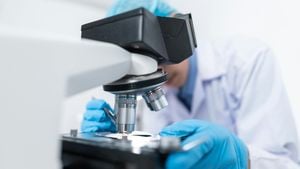Donald Trump’s selection for U.S. Attorney General has taken many by surprise, not just because of the rapid changes within his transition team, but particularly due to the controversial background surrounding his nominees. Following the withdrawal of Matt Gaetz, amid serious allegations and scrutiny, Trump swiftly announced Pam Bondi as his new pick for the prestigious role.
Former Florida Attorney General Pam Bondi, aged 59, is well-known for her long-standing loyalty to Trump and her previous roles within his administration. She has been a prominent figure on the political scene since her term as attorney general from 2011 to 2019. During her tenure, she also held significant positions, such as contributing to Trump’s Opioid and Drug Abuse Commission and being part of Trump’s legal defense team during his first impeachment trial. Given these experiences, it’s no wonder Trump positioned her as the frontrunner to lead the Department of Justice, emphasizing her qualifications and toughness on crime.
Following the announcement, the political chatter around Bondi’s appointment grew louder. Many are now raising concerns about her perceived connections with Trump, especially after it was revealed the Trump Foundation had made a controversial $25,000 donation to Bondi's political action committee. This donation coincided with her decision not to pursue legal actions against Trump University, raising eyebrows and prompt scrutiny. Critics argue this selection may perpetuate what they view as the 'politicization' of the Justice Department, something Trump himself has criticized throughout his presidency.
"She is certainly qualified for the position on paper," notes David Weinstein, a former federal prosecutor familiar with Bondi's background, who recognizably sees her prosecutorial experience as beneficial, contrasting with Gaetz's lack of traditional qualifications for the attorney general role. Many are left wondering how her appointment could impact the current political climate and the future of the Department of Justice. Bondi’s record indicates she will likely pursue more conservative legal policies, shifting focus away from issues like police accountability to instead defending religious freedoms and opposing diversity programs.
While Trump's initial pick, Gaetz, withdrawn remarks brought attention to his turbulent past involving ethics inquiries, the transition to Bondi appears to keep the narrative firmly rooted within Trump’s close circle. Her extensive involvement with Trump’s America First Policy Institute and her commitment to aiding his agenda post-presidency wraps her nomination within Trump’s aim to reestablish his influence over federal law enforcement.
The shifting dynamics within the cabinet show signs of Trump's continuing influence and the reliance on trusted allies. With the Senate set to confirm these nominations, the question arises: How will the appointed individuals navigate the increasing tension between Trump’s agenda and the broader political challenges they face?
Appointments like Bondi might be viewed as solidifying Trump’s hardline approach, especially as he prepares to face multiple legal battles stemming from his presidency. Yet the loyalties of cabinet members can also serve as shields against opposition, reinforcing Trump's battle against what he terms partisan attacks. Bondi’s entry might bolster these defenses but could also deepen divides within both parties.
Trump's legal strategy will likely extend beyond Bondi’s capabilities. With the looming indictments and investigations against Trump, many wonder if her new role will pave the way for legal adjustments aimed at protecting Trump’s interests against misconduct allegations and federal-level scrutiny. Her past comments hint at considerable alignment with Trump’s beliefs on judicial conduct and federal law enforcement reform.
Moving forward, the balance within Trump’s cabinet will shape the Justice Department's functioning and strategy. The potential for Bondi to direct federal resources may influence upcoming trials and investigations involving Trump and his campaign associates.
Overall, Bondi's confirmation will serve as both a pivotal moment for Trump’s transition strategy and as part of the larger narrative of entrenched loyalty within his administration. Leaked statements from lawmakers hint at bipartisan skepticism, but within the Republican ranks, the reception appears to be markedly more supportive. The upcoming Senate hearings could prove to be both foundational to her confirmation and illustrative of the crumbling bipartisan trust present within the federal government today.
This saga continues with Trump’s repeated assertions of corruption within the Justice Department leading up to the pivotal developments expected post-confirmation. With major resignation announcements coming from Trump's team, eyes are going to be glued to how Bondi carves out her role as Attorney General. Will she continue the status quo or will she enact much-needed reforms? The stakes couldn’t be higher either way, as the eyes of the nation watch to see how this new appointment plays out.
Bondi's vast experiences are undoubtedly expected to lead to immediate legislative pushes geared more conservatively, hence amplifying Republican voices within the Department. The future of the DOJ remains uncertain, but with such allies on his side, Trump intends to keep driving his agenda forward, fighting against what he perceives as political warfare.
One thing certainly remains clear: Bondi’s nomination signals not just fidelity to Trump’s policies, but also indicates the ex-president's intent to influence the justice system's role within future political landscapes.



